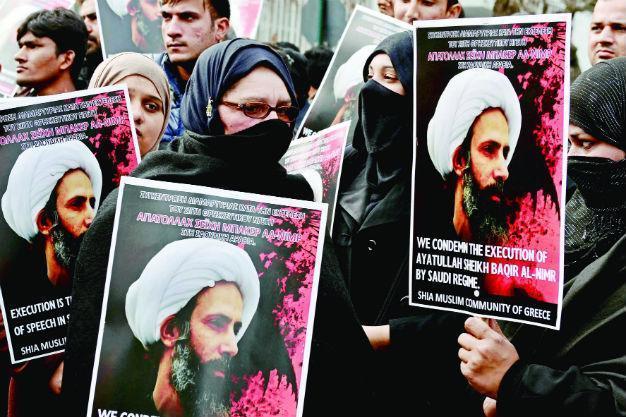Iran deputy minister says Saudi dispute will affect Syria peace talks
DUBAI / ANKARA

AFP photo
Tehran’s diplomatic row with Saudi Arabia will affect Syrian peace talks, Iran’s deputy foreign minister said Jan. 6, adding that his government would remain committed to the talks.
“Saudi Arabia’s wrong decision will have an effect on [Syria] talks in Vienna and New York, but Tehran will stay committed,” Hossein Amir-Abdollahian was quoted as saying by Iranian state news agency IRNA.
Turkish President Recep Tayyip Erdoğan on Jan. 6 refused to condemn Saudi Arabia for its execution of 47 convicts, including a prominent Shiite cleric, saying it was an “internal legal matter” of the kingdom.
“The executions in Saudi Arabia are an internal legal matter. Whether you approve of the decision or not is a separate issue,” Erdoğan said in a televised speech, his first reaction to the controversy which has raised tensions between Saudi Arabia and its regional rival Iran.
The Turkish president last month visited Riyadh for talks with King Salman and the political elite, in a new sign of Ankara’s warm ties with the kingdom.
Turkey and Saudi Arabia, both overwhelmingly Sunni Muslim powers, share the same vision over the conflict in Syria where they believe only the ousting of President Bashar al-Assad can bring an end to almost five years of civil war.
Tensions between the two countries, which are both active in the international talks to put an end to the civil war in Syria, have grown after Saudi Arabia executed 47 people on Jan. 2, including four Shiite Muslims, among them prominent cleric Nimr al-Nimr, a move that triggered protests and the storming of the Saudi embassy in Iran on Jan. 3.
Iran’s top leader, Ayatollah Ali Khamenei, predicted “divine vengeance” for the execution of al-Nimr, an outspoken opponent of the ruling Saudi family.
The turmoil have triggered a polarization between many Muslim nations.
Djibouti cut diplomatic relations with Iran on Jan. 6, its foreign minister said, in response to the storming of the Saudi embassy in Tehran by Iranian protesters.
The tiny Horn of Africa nation, which is home to the United States’ only military base on the African continent, joins Saudi Arabia, Bahrain and Sudan in entirely severing relations with Iran.
“Djibouti cut its diplomatic ties with Iran out of solidarity with Saudi Arabia,” Foreign Minister Mahamoud Ali Youssouf told Reuters in a text message.
Bahrain said on Jan. 6 it had caught an Iranian-linked cell plotting attacks on its territory, days after it followed its close ally Saudi Arabia in cutting ties with Iran.
There was no immediate reaction from Iran, caught up in a mounting diplomatic dispute with its regional rival Saudi Arabia and other Sunni-led Gulf states including Bahrain.
“A secret terrorist plot aided by the so-called Iranian Revolutionary Guard and the Hezbollah terrorist organization was foiled,” the Gulf island kingdom’s state news agency BNA reported.
“It targeted the security of the kingdom of Bahrain by [plotting to] carry out a series of dangerous bombings,” it added.
Iran has regularly denied accusations in the past of involvement in attacks in Bahrain, which has been in political turmoil since protests erupted there in 2011, led by majority Shiite Muslims demanding an end to the Sunni monarchy’s political domination and full powers for parliament.
